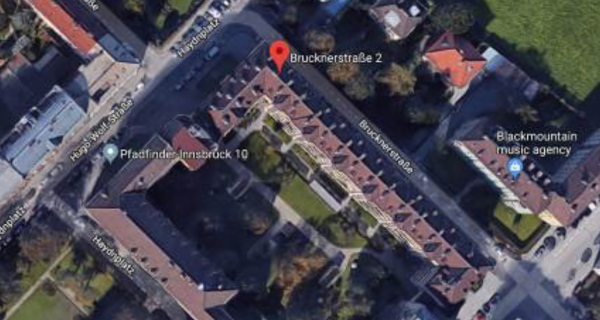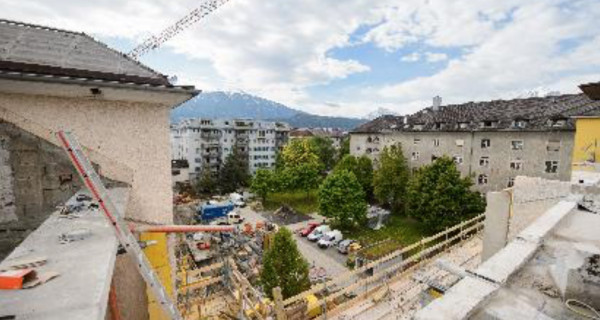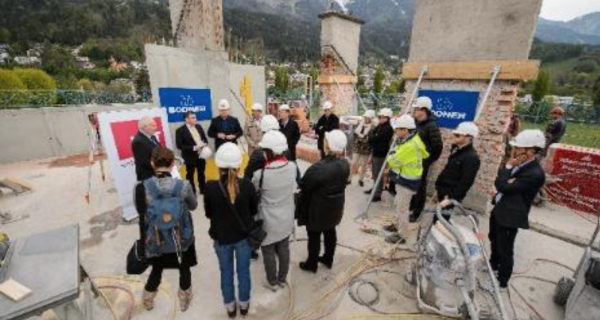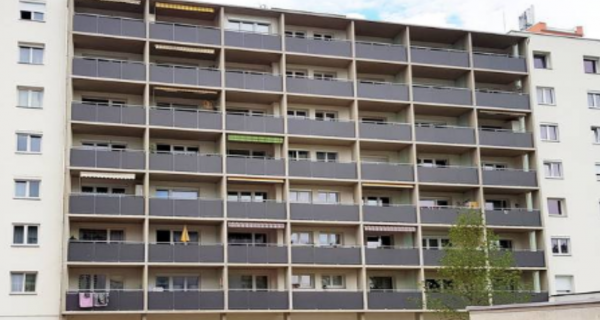Brucknerstrasse/Viktor-Danklstrasse
Name and address
Brucknerstraße 2,4,6,8,10, 12 / Hugo-Wolf-Straße 2,4 / Viktor-Danklstraße 11 in 6020 Innsbruck, Austria
Map
City map highlighting the surface occupied by the demo site

Description
NHT already finished the innovative overall building renovation, consisting of the thermal renovation of walls, ceiling and windows with triple-glazing. The thermal bridges of the balconies will be eliminated by insulating the floor of the balconies from below. 20% of all flats have been equipped with a decentralised, flat-specific ventilation system with heat recovery. The rest of the flats will be equipped with these systems progressively. New gas boilers are already partly installed.
Ownership
Neue Heimat Tirol (NHT)
Gross conditioned floor area: 5,710 m²
Treated floor area: 5,197 m²
Number of dwellings: 92
Energy performance
BEFORE RENOVATION
Heating demand EPC (Energy Performance Certificate according to the Austrian Institute of Construction Engineering): 107 kWh/m²yr
Heating demand PHPP (Passive House Planning Package): 110 kWh/m²yr
TARGET/AFTER RENOVATION
Heating Demand EPC: 16 kWh/m²yr
Heating demand PHPP: 20 kWh/m²yr
Overall savings
85%
All objects are patched via 1 long and 2 short complexes of buildings.
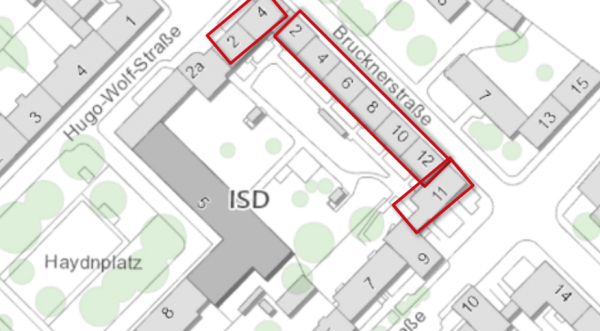
Building envelope
IN13 is a typical building block constructed in the second half of the 20th century with related challenges in regards to insulation, electric cables, low performing windows, uninsulated roofs and cellars. The building block includes newly constructed integrated apartments through expansion of the floors.
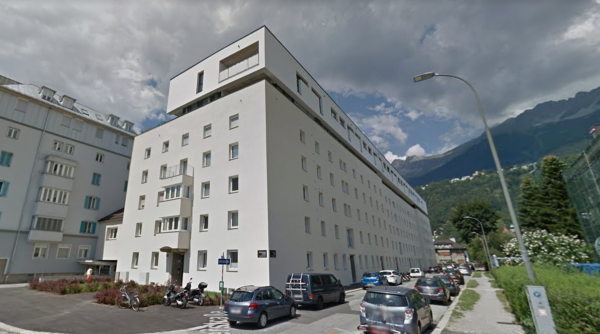
Technical system
The building has a decentralised heating system. It is a building of Category D.
Concept
Thermal renovation of the walls, the ceiling, the roof and the windows with triple-glazing. Balconies were completely replaced by new thermal bridge-free ones. Decentralised, flat-specific ventilation with heat recovery was integrated.
Energy Solutions
- The facade is additionally insulated by 16 cm-thick EPS panels to the existing mineral wool of 6cm,
- Loggias are additionally insulated by 18 EPS-F panels to the existing mineral wool of 6cm,
- Replacement of windows with triple-glazing windows (70% better thermal performance),
- Ceiling of unheated basements insulated with an additional 10-25cm-thick layer of cellulose,
- Decentralised ventilation systems are placed in the bathrooms. The ventilation system is arranged under a cascade model. 19 of the 92 flats are already equipped with the ventilation systems, the rest of the flats is prepared to be equipped with these systems in the event of a change of residence
- DHW and space heating is equipped with efficient, modern bio-gas driven gas-fired boilers with condensing technology
- LED in all public spaces
- The PV system is installed mainly for the self-supply of the building, feeding only the surplus of solar electricity into the public grid.
Performance target
Target is to achieve a calculated energy consumption per m² of total used energy per conditioned floor area of about 63 kWh/m²*a (Heating and DHW according to the Handout Certificate). In other words, the target is to achieve a Category A Energy Efficiency Certificate.
Financing model
The refurbishment is financed via a mix of reserves as well as local/ regional/ national/ EU funding and includes an increase of the monthly rent.
Envelope details
Roof to wall insertion section (thermal bridge)
Newly constructed apartments by expanding the floors according to the standards set by the Passive House Institute.
Ground to wall section (thermal bridge)
Ceiling of unheated basements insulated with an additional 10-25cm-thick layer of cellulose.
Wall to fenestration section (thermal bridge)
- Thermal insulation of the façade (16cm EPS in addition to the existing 6cm-layer of wool)
- Loggias are insulated (18cm EPS-F in addition to the existing 6cm of wool)
- Replacement of windows with app. 70 % better thermal performance
Technical system
Mechanical ventilation
19 of the 92 apartments are already equipped with ventilation systems and represent 20% of the building users. All other apartments will be upgraded in the event of a change of residence.
Electric renewable integration
Nominal power of PV IN 13: 49,95 kWp, 330m² SOLARWATT modules
Mounting type: Roof mounted parallel
Elevation: 574 m a.s.l.
Tilt: 10°
Azimuth angle: 225°
Financial model: Feed-in-tariff based on maximising the self-supply of the building
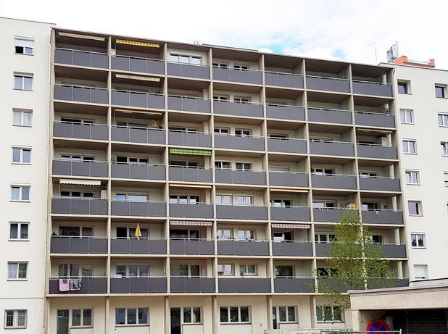
Stakeholders involved
Contracting authority: NHT Neue Heimat Tirol
Project manager: Gerda Maria Embacher
Architect/Envelope Designer: Reitter architekten ZT GesmbH, Helmut Reitter, Innsbruck
Technical system designer:
- Opbacher Installationen GmbH, Fügen
- Alternativ Installationen, Innsbruck
- TKT Haustechnik GmbH, Rum
Construction company: Bodner Hans Ing. BaugesmbH & CO KG, Kufstein
Windows supplier: Farkalux GmbH, Kematen
Energy consultant, scientific support: University of Innsbruck and Passive House Institute – Department Innsbruck
Refurbishment costs
Total investment of app. € 4,1 Mio.
Work progress
The challenges in the course of the refurbishment of residential buildings are complex and multi-layered. Financial and social aspects and challenges need to be considered, because the tenant has to co-finance some parts of the renovation, which requires the implementation of persuasion and tenant engagement activities. Furthermore, legal challenges also have to be solved. The most intensive persuasion is to be done in the field of nearly zero energy house renovation and especially in cases where tenants are living in the flats during the time of ventilation system installations and other intrusive renovation activities.
Within SINFONIA, NHT has pushed the installation of controlled ventilation with heat recovery in IN13. For the time being, 20% of the building occupants have agreed on this measure. Further extension is expected according to the fluctuations of the building users and corresponding rental contracts with the new tenants.
Prognosis for the renewable energy yearly yield: 50,480 kWh/a
End-Energy use (EPC): Calculated with 63,2 kWh/m²yr
Energy efficiency certificate (EPC): Category A
EnerPHit pre-certificate for stepwise refurbishment (PHI): EnerPHiT certification is foreseen on short-term
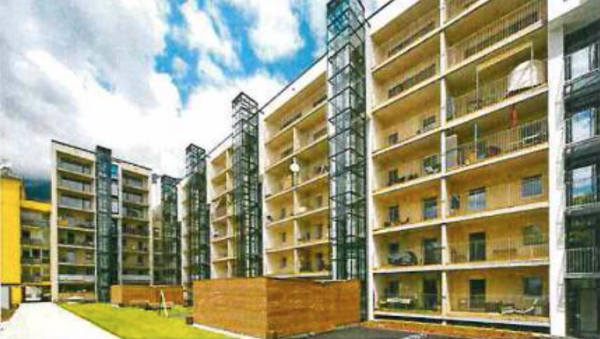
Building owner
Neur Heimat Tirol (NHT)
Architecture / Engineering
Reitter Architekten ZT GesmbH, Helmut Reitter, Innsbruck
Contact
Standortagentur Tirol
Tel : +43.512.576262

